“You Could See Them Like Darkness” – First Civil Party on the Trapeang Thma Dam
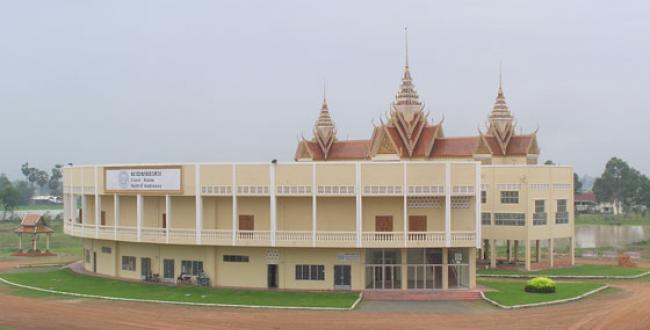
The ECCC Trial Chambers (picture via this blog)
Today on Monday July 27, the Trial Chamber returned from its summer break and resumed the hearings with testimony on the third and final worksite of case 002/02: the Trapeang Thma Dam in the Northwest Zone.
The indictment or closing order alleges that “[t]housands of people were made to participate in the construction of Trapeang Thma . . . The Chinese press report . . . puts the figure at 20,000 workers.”
It continues to describe the working conditions: “Workers were not allowed to stop and rest during working hours. Most of the witnesses say they were forbidden to talk with each other. Short breaks to drink or urinate were allowed, but monitors and spies at the site would note and report every “lazy” worker, thus people did not dare to ask for break.”
The lack of food is alleged to go as far that “[n]o one dared complain about the food rations for fear of being killed. Workers at the dam died of starvation and of exhaustion directly at the work place while carrying the earth.”

The irrigation system of the Trapeang Thma Dam (picture via this trip report by DC-CAM)
“Hygiene was totally lacking,” it continues, “[g]iven these conditions, many people died due to illness with some family lines almost dying out entirely.”
Some witnesses gave evidence, according to the allegations in the closing order, of “witnessing or participating in marriage ceremonies at Trapeang Thma, often with scores of couples being married in mass ceremonies. One witness states that the couples were forced to marry, and others that marriages would have to be approved by unit chairmen, and workers would be killed for failing to seek permission.”
And the executions: “Many were killed by being beaten and thrown into the reservoir basin. Others would be made to dig their own graves and then clubbed to death. Witnesses report of pregnant women being beaten, killed and thrown into the reservoir basin, as the CPK cadre would say that “the dam would hold firmly only if pregnant women were killed and placed at the sluice gate”. The “Bridge 1” or “sluice gate 1” was a common execution location. The bodies would then be dumped at the bottom.”
__
All parties and lawyers were present in their usual places (Nuon Chea in his holding cell) except Judge Fenz who was absent for personal reasons. Reserve Judge Martin Karopkin took her place.
Statements from Case 004?
Before the civil party was called to the stand, the Chamber gave each party ten minutes to discuss whether OCIJ statements and Civil Party from case 004, related to the Trapeang Thma Dam, that were disclosed on Friday by the Prosecution should be admitted and if so, whether the parties should be given more time to review them.
Mr. Dale Lysak, International Senior Assistant Prosecutor, took the floor first and explained there were two types of documents that had been disclosed on Friday July 24th at noon: five recent OCIJ interviews and forty-seven Civil Party applications.
Lysak said that he was able to get through them, by himself, on Friday afternoon.
He admitted that it was “far from ideal” that these disclosures were happening the week before a trial segment is supposed to begin but “everyone in this court works with limited resources.”
Lysak was adamant that these disclosures did not affect the chamber’s ability to move forward as there was already a lot of evidence in the record and these did not add anything new, but just corroborated other testimony.
Ms. Marie Guiraud, International Civil Party Lead Co-Lawyer, took a few minutes after Lysak to explain that she defers to the wisdom of the tribunal in this matter, and that her priority “is that the court should move forward as quickly as possible.”
Mr. Victor Koppe, Co-Lawyer for Nuon Chea, started by saying that he wanted to bring this disclosure in question into perspective. He explains that since November 2014 there have been thirteen disclosures which amount to a total of 8,344 pages.
He emphasizes this point to say that the defense has only been able to read these disclosures marginally, allegedly due to the sheer volume of pages. Koppe adds that they have not even been able to discuss them with their client.
“I don’t know how the trial judges [keep up with these disclosures] because we have not been able to,” Koppe says. He then adds that the prosecution’s categorization of this situation being “far from ideal” is the understatement, not of the year, “but quite an understatement.“
Koppe then asks the principled question, according to him, that is: “why do we need these civil party applications [from case 004] in case 002/02?” He says that it may be pure speculation but that it may be because case 003/04 may never happen, “and that’s why we are being flooded [with them].”
He then adds that Civil Party Applications need to be given equal weight as witness testimony and warns that “once they go in you cannot take them out.”
Koppe asks the Chamber to dismiss the request for disclosure made by the prosecution and if not to adjourn the hearings for two days to give the defense time to look at these disclosures.
Ms. Anta Guisse, Co-Lawyer for Khieu Samphan, starts by says that “it makes light of the defense work” to say that one can go through the fifty-four documents in one afternoon. She then asks why they cannot be left as part of case 003 and 004. She alludes that the defense teams in those cases have rights too, but doesn’t clarify what she means or what it has to do with the disclosures at hand.
Guisse then implies that it appears contradictory to say that “we can go through them pretty briskly because they add no new information” but that they are nevertheless important. She emphasizes that “we are not basing ourselves in case 003 and 04” and that these documents should be rejected to the trial can move forward.”
Otherwise, she asks for a one week deferral plus an additional two days.
Lysak takes the floor respond and explains how the defense teams behaved when they were offered the documents last Friday. Lysak says that the Nuon Chea defense team refused to accept the documents and requested that they would accept them on Monday at noon. “The Khieu Samphan defense did not even respond to our email,” Lysak adds.
He further clarifies that this is not a request for admission but a disclosure of documents so that they are available to any of the parties that want to use them. “We disclosed these as a matter of fairness,” he adds.
The Chamber takes a break to deliberate on the postponement of the proceedings requested by the defense teams. After the break the President informs the parties, the chamber and the public that the Bench has not reached a decision and adjourns the proceeding again to further deliberate and have lunch until 1 p.m.
After the break, the Chamber decides that it will continue as planned –that is, to hear the civil party testimony on the Trapeang Thma Dam– because the notification of disclosure is not a request for admitting evidence, and rescheduling the witnesses and civil parties would be complicated logistically. Furthermore, the Chamber advises that if any of the parties are prejudiced by the disclosures of the prosecution from last Friday they may recall witnesses and civil parties.
The Chamber will not sit next week so that the defense can have time to read these disclosures and because another judge apart from Judge Fenz will not be present. We are not told who it is.
___
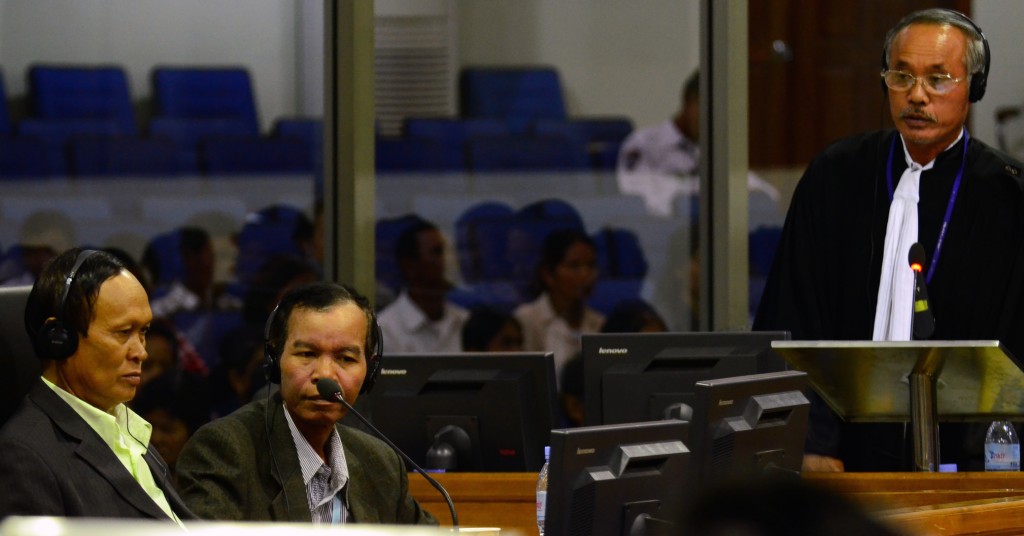
Civil party Mr. SEN Sophon (left) with a TPO representative to give him support throughout his testimony. The lawyer questioning him on the right is Mr. HONG Kim Suon, national co-lawyer for the civil parties. (ECCC Flickr)
Civil Party Testimony on Trapeang Thma Dam
Civil Party, 2-TCCP-220, took the stand. The Civil Party’s name is Mr. SEN Sophon, He was born on May 3rd 1960, in O Touk village, Kompong Preang commune in Phnum Proek district, Battambang province. His father’s name is Sola Yun. His mother’s name is Sen Sal. His wife’s name is Lok Than and they have four children together.
The floor was given to the civil-party co-lawyers. Mr. HONG Kim Suon started the examination.
Before 1975, Mr. Sophon lived in Phnom Penh in Orussey Quarter with his family. He was forcibly evacuated on the 18th of April of 1975.
In 1976 he was evacuated again from Prek Raing village to Battambang Province (sector five under the CPK) under the guise that he was going to return to Phnom Penh. He went with his family and other “17 April People.”
Mr. Sophon remembered that in 1976, while he was being evacuated, he went through Phnom Penh and it was empty. “There was only trash,” he said.
When he arrived in Battambang province he was put in the “middle aged” or “adult” group to do rice farming (even though he was 16). He was told to work for a year there. The food ration was very scant. “There were only two cans of rice for fifteen of us,” Mr. Sophon said.
Mr. Sophon explained that his shifts started very early. “Everyone had to wake up at 2 a.m. so that we could take cattle into the field… we had to work until 11:30 a.m. and then we could have lunch.“
Mr. Sophon says he never witnessed anyone being arrested in the “adult group.”
Trapeang Thma Dam
He then explains that in 1977 his unit chief rounded up his group and sent them to work at Trapeang Thma Dam. Mr. Sophon remembers perfectly that the Dam was at Phnom Srok District in Sector Five.
The work quota was 3 meters of cubic soil per day per person. He said that the bell rang at 4 a.m. and they worked until 11:30 a.m. when they would stop for gruel. They would resume their work at 1 p.m. and would continue until 9 or 10 p.m. “If we did not finish our work quota, we had to try our best to complete it,” Mr. Sophon added.
The work quota was not the same for everyone. Some had to do 3.5 or 4 cubic meters per day, Mr. Sophon said. He only had to do 3, he said, because he was part of a group.
Mr. Sophon says that at the place where he worked at the dam, the crest was 30 meters high and the bottom was 50 meters deep (if the translation was accurate).
He worked there for two months. There were many women, Mr. Sophon confirmed, and there was no medicine.
Mr. Sophon does not know about deaths or torture but he did notice people disappearing from every unit, including his own, from time to time.
Mr. Sophon names Ta Val as the head of the Dam but never met him. (which coincides with the allegations in the closing order, which are of course drawn from witness interviews).
“No resting time for no workers, no holiday when there was holiday,” Mr. Sophon said.
There was only one set clothes given to each worker plus one scarf.
In 1978 he was sent to dig canals at another worksite. He said the working conditions were the same as in Trapeang Thma.
One day at around 10 p.m., Mr. Sophon said that a woman told him, “Uncle Phon, you will be taken away and killed.” Mr. Sophon said he escaped in the rice containers and ran away. He said that he walked for a week with no food until he arrived at a potato farm and took some potatoes, cooked them, kept them with him and continued.
He arrived at Chruop (phonetic) where he met an old woman named Truap (phonetic), who knew him and told him that his parents had been killed because his father was a former soldier. He was allowed to stay with her since he had nowhere to go.
After the regime, he tried to find his parents. “I tried everything,” Mr. Sophon said, “I went to Battambang, to Siem Reap, to their place of birth, but I couldn’t find them, and I knew they were dead.”
Kim Suon asks him if the memories from that time stayed with him or if they just disappeared.
“The events and experiences are with me always,” Mr. Sophon said, “every time it comes to my mind I can barely hold my tears.“
“You can ask for reparations from this Court, what would you like to ask of this court?” Kim Suon asks.
“I lost everything, my house, my land and my family. I want this court to prosecute the senior Khmer Rouge leaders.”
Mr. Suon ends his examination and gives the floor to the prosecution.
—
Mr. SENG Leang, Deputy Prosecutor, takes the floor first.
Mr. Leang confirms that no one could nor dared refuse to go to work at the Trapeang Thma worksite. When asked why, Mr. Sophan responds : “The fact is I was afraid to die.”
Mr. Sophon remembers that his unit chief was Phon.“Just like my name,” Mr. Sophon said.
Mr. Sophon, the civil party, cannot remember in which month of 1977 Phon sent him to the Trapeang Thma Dam.
Mr. Leang attempts to read for his OCIJ interview where Mr. Sophon had said that he was sent there in May 1977.
Objection
Koppe objects on the ground that the recent hearings at the Supreme Court chamber (SCC) allegedly established a practice where one cannot confront witnesses with their statements and ask them to confirm.
When Judge Lavergne asks him to give the reference in the transcript when this was decided, Koppe admits it was a written decision on guidelines for the hearings before the SCC (which are not binding). Koppe proceeds to read the guideline in questions but can only find the French copy. He does a good job with his French to read the guidelines from the recent evidentiary appeal hearings on case 002/01 which seem to in fact preclude reading statements and asking them to confirm them but does not preclude them from using them for other purposes.
Mr. Joseph Andrew Boyle, Assistant Prosecutor, points out that the purpose of the questioning from his colleague was not to confirm but to refresh his memory, that this has been a long and established practice at this tribunal and that if Koppe wanted to challenge it he should have at least put it writing, and thirdly that the Trial Chamber has ample discretion in how to conduct its hearings notwithstanding what the SCC had chosen as guidelines for its evidentiary appeal hearings.
Judge Lavergne explains that simply reading from a witness or civil party’s past statements and asking him or her to confirm each time is not the proper way to conduct an examination. Lavergne says, though, that reading prior statements for purposes such as refreshing the memory of the witness or civil party or testing their credibility is allowed.
Back to the Trapeang Thma Dam
Mr. Leang rephrases his question and Mr. Sophon confirms that he was sent to the Trapeang Thma dam in May 1977.
Mr. Sophon then confirms that there were thousands of workers at the Trapeang Thma dam.
Mr. Sophon explained that his group only had to carry 3 cubic meters per day because his group came from the rear battle-field and thus it was not a regular-strength group. The regular-strength group were the ones who came from the front battlefield. The minimum quota for any group was 3 cubic meters.
He then confirms that the only tools they had were two baskets, a pole, and a hoe. “We sometimes had to use our hands to load the dirt and rocks onto the baskets,” recalls Mr. Sophon.
Mr. Sophon remember carrying the earth for a distance 15 meters. The weight was about 30 to 40 kilograms.
Mr. Sophon then repeats that the bell was rung at 4 a.m. and “anyone who did not wake up, would be whipped.”
If someone was lazy, “the unit chief would come and whip him and chase him to go to work,” Mr. Sophon also said.
The unit chief said at meetings, according to Mr. Sophon, that if anyone did not obey Angkar they would be taken away and killed.
Mr. Sophon said that he saw it with his own eyes that someone died from starvation. “And he begged from some rice but they wouldn’t give it to him. He died. And it happened right in front of me,” he said.
As to the sleeping conditions, “there was no pillow, there was no mosquito net, there was no mat… some people slept on the ground itself,” he explained.
There were no latrines and people relieved themselves in the bushes. There were many flies and mosquitoes. “If you talk about flies, there were swarms of flies. You could see them like darkness,” Mr. Sophon said.
Mr. Sophon said he was sick twice during his time at the dam and all they gave him was rabbit-drop pellets.[1]
___
Mr. Joseph Andrew Boyle, Assistant Prosecutor, then takes the floor.
He confirms that Mr. Sophon was in a hundred-member group at the Dam.
Boyle also confirms that Mr. Sophon recalls that the Southwestern Zone Cadres arrived and took control in 1978. Mr. Sophon says it was Yey Chaem that arrested Ta Val (the head of the Trapeang Thma dam) and his parents and sent them away to be killed. He said that Yey Chaem was more cruel than the former leaders because more people died. His own life stayed similar as his quota did not change.
Mr. Sophon said that at the beginning they ate three times a day at the dam but afterwards the rice ran out and they only ate two times a day.
Base and New People
Mr. Sophan said that “base people” ate rice when “new people” like him could not. He also said that “base people” did not work as hard because they could tell “new people” to go work for them.
Cham and Vietnamese
Mr. Sophan said that no one talked about Vietnamese at his worksite. He also said that there were Cham at the worksite but nothing happened to them. “But maybe it was different in other worksites” he added.
Disappearances
Mr. Sophan can only recall the name of one of the people who disappeared. A person from his unit named Oeun was taken away and killed. He did not see him being taken away and could not tell how he concluded that he had been killed. Mr. Sophan did say that he remembers many people disappearing from time to time. but cannot recall their names.
Forced marriages
Mr. Sophan remembered that there were forced marriages.
“The woman and the men did not love each other at that time. Ten or twenty couples were married at the same time,” he said.
He recalls that in Spean Sraing village, there were five men and five women sitting across from each other and they were made to swear vows to each other. “I was not forced to get married at that time but I was there as a witness at the ceremony,” he added.
—
The court adjourned and it will continue hearing Civil Party Mr. Sophan tomorrow at 9 a.m.
_____________
[1] “This home-made ‘medicine’ consisted of plant roots, tree bark, the sap of the tropical thnung tree, and other “natural” compounds.It was known throughout the country as “rabbit dropping” or “rabbit pellet” medicine (achtunsai) because of its appearance and ineffectiveness. Made without scientific testing, rabbit pellets more often killed patients or made them worse than healed them,especially because they were given to all sick patients regardless of their symptoms.” www.d.dccam.org/Abouts/Intern/LauraVilim_KRMedicalPractices.pdf
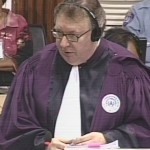
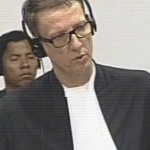
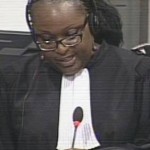
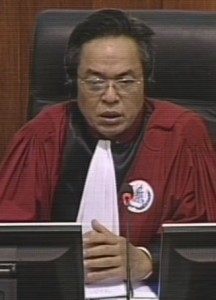
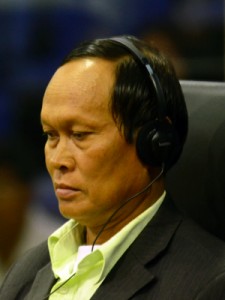
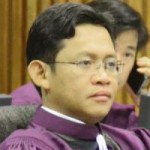
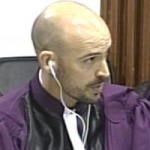
[…] Today, on July 28, the Trial Chamber continued the second day of hearings on the Trapeang Thma Dam worksite. (For some context on the charges alleged against the defendants at this worksite, read the introduction to yesterday’s post here). […]
[…] For a short summary of the crimes which are alleged to have been committed by the defendants at this worksite—crimes against humanity including enslavement, executions and forced marriages—read the beginning of the July 27th post here. […]
[…] including enslavement, executions, and forced marriages—read the beginning of the July 27th post here. […]
[…] For a short summary of the crimes which are alleged to have been committed by the defendants at the TT Dam worksite—crimes against humanity including enslavement, executions, and forced marriages—read the beginning of the July 27th post here. […]